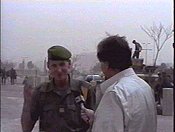 |  |  |  |  |
 | ||||
Stan Remembers: Saddam out of control, Kuwait in flames
Reporter: Stan Atkinson Photographers: KOVR 13 News, KCRA News It's hard to believe that it's almost been ten years since the gulf war crisis. It was August 2, 1990, when Iraqi troops took over neighboring Kuwait. As usual, Stan Atkinson wanted to be where the action was. And he got his wish. Stan Atkinson: If you want to find out what a country is like, bypass its leaders and talk to its people.
For about a week in the fall of 1990, a newscrew and I flew into Baghdad from Amman, Jordan. I was working for KCRA at the time. We talked to shopkeepers, soldiers, and students and quickly learned that the common man's devotion to Saddam Hussein was nothing short of cult worship. Everywhere we went, there were murals and statues depicting Saddam. And the people fairly glowed when they talked about the man who had led them since 1979. A man most of the world regarded as a brutish and paranoid lunatic. In Amman, I learned that the US blockade was hurting Jordanians more than the Iraqis, since a large part of the Jordanian economy flourished by providing goods and services to the oil-rich Iraqis. A highlight was talking with Jordan's Queen Noor. Born in the USA, the former Lisa Hallaby told us that her husband - the late King Hussein - and other middle eastern leaders hoped for an Arab solution to the crisis without American intervention. The Jordanians wish did not come true.
Just a few short weeks after we left, the United States struck Baghdad and Americans were engulfed in Operation Desert Storm. After the war, hundreds of Kuwaiti oil wells were set ablaze by the retreating Iraqi troops. even on home video I shot, you can hear and see the intense winds the well fires created. The American crews had to cap the wells one by one, and performed the task with incredible skill. It was like working in the bowels of hell. Even from the rooftop perch at our hotel in Kuwait city miles away, the black smoke hung like latent death over everything, obscuring the sun and turning broad daylight into dusk. The shroud of smoke underscored the destruction that surrounded us everywhere we went. And the humor of all the news crews could be as black as the sky. Stan Atkinson / 1990: "Ed says when he arrived he asked Michey and Tarrig - the Egyptian camera crew - if there was any good nightlife. And they said, 'yeah, try the disco at the Sheraton.' So here we are at the Sheraton. What's left of it."
Even more visceral signs of destruction littered the highway outside of Kuwait, where some 3,000 Iraqi soldiers died in their tracks as they tried to retreat. Stan Atkinson / 1990: "These tanks apparently tried a different route, cross country. Didn't get very far." The Iraqis left behind plenty in their hasty retreat, including deadly mines buried in the sand at beaches that used to cater to wealthy tourists. French Foreign Legionaires let us look over their shoulders as they went about the dangerous task of removing them. But of course, someone had to lead the way. Stan Atkinson / 1990: "'Just stay in the corridor,' he said. And there they go. Hey, make big footprints! I gotta walk in them!" The crews worked 20 minutes, then rested 40. A reasonable work schedule when one false move could mean a lost limb or death. At refugee camps along the border, we found Iraqis who did not support Saddam who fled when the war broke out. Pariahs in their own country, they weren't welcome anywhere else, either.
At times we felt like wanderers too. Getting in and out of various jurisdictions was always dicey, never sure that we might not be turned back at one of the checkpoints we had to go through. Stan Atkinson / 1990: "Well, that was what we call the immigration point from hell. Because we went in there to find out that we now have to go back to Kopje to visit the emir of Kopje and get a piece of paper from him, which allows us to Saudi Arabia. A small point which seemed to go over everybody else's head." One of my lasting impressions from this whole trip: the decimated main post office in Kuwait City. The Iraqis had ripped open every letter and package looking for money. From the American view, as wars go, the liberation of Kuwait had seemed to come easily. It was quick and decisive. But as wars go, for the people of Kuwait, nothing about it was easy. The imprint of evil the Iraqis left behind was everywhere. Back to top of the page Back to the Stan Atkinson page |
News Scripts News Team Question of the Day Sites & Links
Stan Remembers: Father Hoa and his little army Stan Remembers: On the road with LBJ Stan Remembers: Way news is covered has changed since the Donner Ridge forest fire Stan Remembers: 1977 Cuba a mixture of heaven and hell Stan Remembers: Vietnam and BT Collins, fates intertwined Stan Remembers: Dangerous days covering El Salvador Stan Remembers: The tragedy in Cambodia Stan Remembers: Sometimes covering the news risks your safety
6 am Daybreak News at Noon News at 5:00 News at 6:00 THE 10:00 News Saturday 5:00 Saturday 11:00 Sunday 6:30 Sunday 11:00 |
 | ||||




